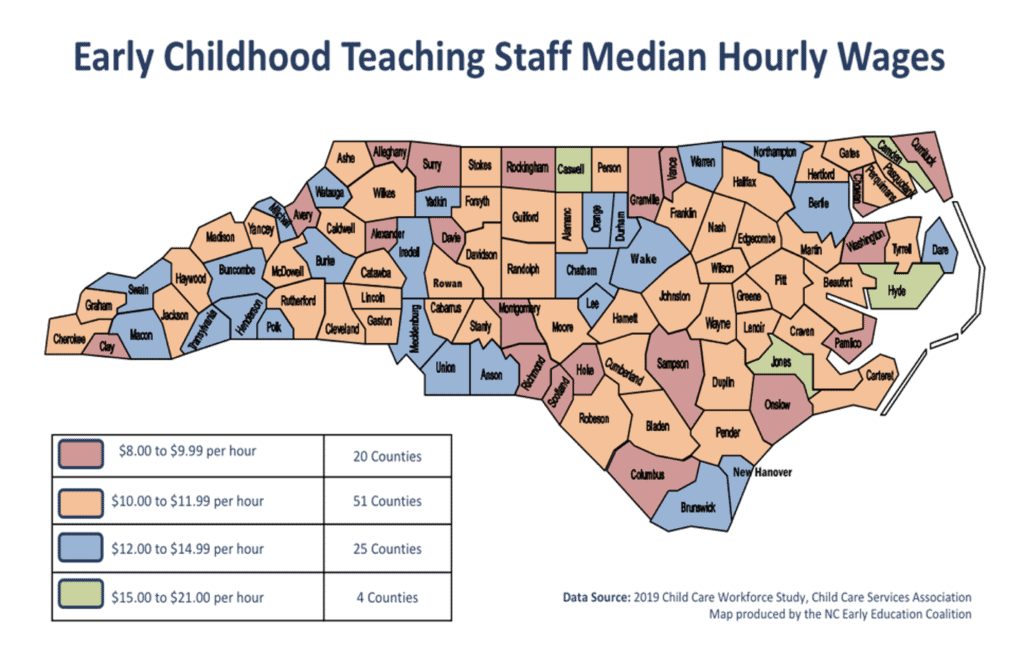For the last 15 months, the child care community has faced numerous ongoing hardships including temporary closures, reduced enrollment, and increased operational costs. Although many programs have reopened their doors, child care directors are still facing severe staffing shortages and unable to find qualified teachers. Parents are returning to work, but many families are struggling to find quality care for their children.
Child care is one of the most important jobs in our state, yet child care teachers are some of the lowest paid workers. In the last year, 32% of child care workers have left the early education field. However, North Carolina’s child care workforce shortage has been building for years. Now as families reenter the workforce, child care programs are having to turn them away because they can’t fill classrooms with teachers. The workforce crisis is real and worse than it’s ever been.
We have a workforce crisis because child care teachers, overwhelmingly women and primarily women of color, are paid poverty-level wages and few benefits for the vital work they do. Child care programs in 73 counties pay teachers $12.00 per hour or less, and 20 of these counties pay between $8.00 and $10.00 per hour. In Wayne County, many of our teachers make $10 per hour, and teaching assistants make even less.

Teachers Deserve Higher Wages
Child care programs operate on razor thin margins already and don’t have the financial resources to pay teachers better. They just can’t compete with Amazon, Walmart and other retailers that pay $15.00 per hour. It’s no wonder that child care teachers who are struggling to make their own family budgets work are looking for better paying jobs elsewhere.
Earlier this year, Brooke King, Director of Creative Academy in Goldsboro shared why compensation remains such a challenge on our Wayne Child Advocacy Network virtual town hall:
“We want the right people for our children, we want the most educated people for our children, and we need to compensate them for that. That has been very difficult and it becomes even more difficult when we don’t have enrollment up. We’re competing with places like Hobby Lobby, who can pay their staff $3 more than I can pay my staff, who have to have an education.” -Brooke King
The early childhood workforce also typically lacks benefits, including health coverage. Throughout the pandemic, we’ve asked child care employees to risk their health in order to stay open to teach and support our youngest learners. Yet, if educators become sick, there is often no way for them to take care themselves.
Supporting the Workforce Behind the Workforce
Child care is essential and should be funded like a public good. Until we get there, we can still take urgently-needed steps to address the workforce crisis and support child care teachers, programs, communities, and families.
Thanks to the American Rescue Plan, we have the opportunity to do this! North Carolina will receive $1.3 billion in federal child care relief funding. We can use these funds to support early childhood workforce compensation and other much-needed child care efforts. Now is the time for policymakers to address this workforce crisis through compensation strategies that really will make a difference. Only then will we attract and retain the early childhood teachers our youngest children and their families need and deserve.
Join the #WorthyWagesNC Campaign
Take Action with our partners at the NC Early Education Coalition! Contact your state legislators now. It’s time to ask policymakers to invest in the early childhood workforce. Early educators shape the brains of our next generation and investing in the workforce builds a stronger, more sustainable child care system for the future.
Valerie Wallace is an early childhood education advocate, and the Executive Director of the Partnership for Children of Wayne County.



